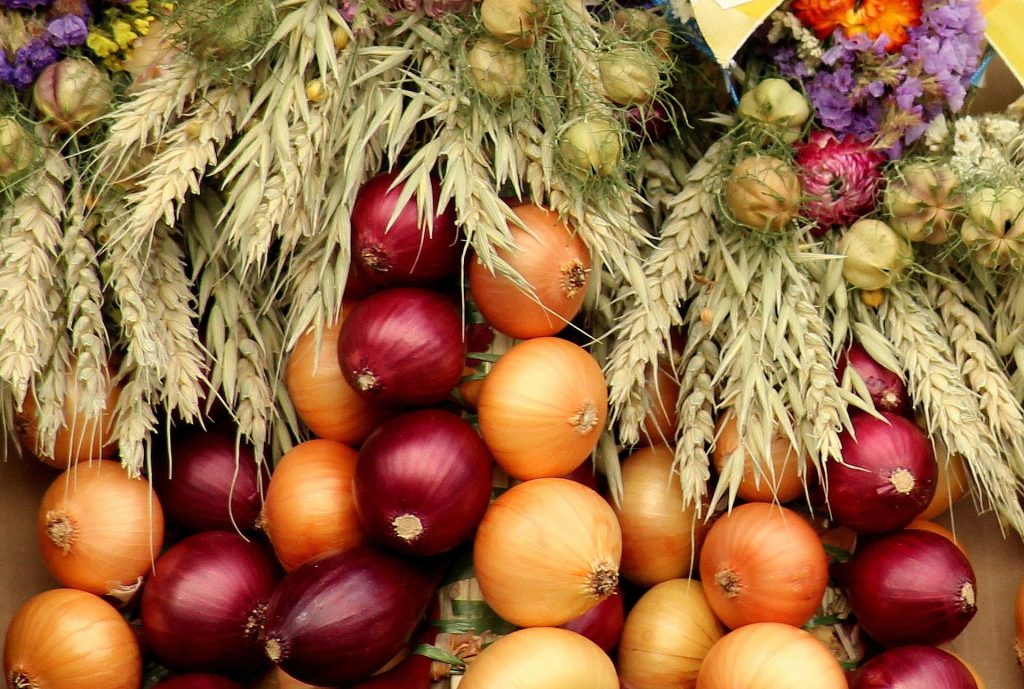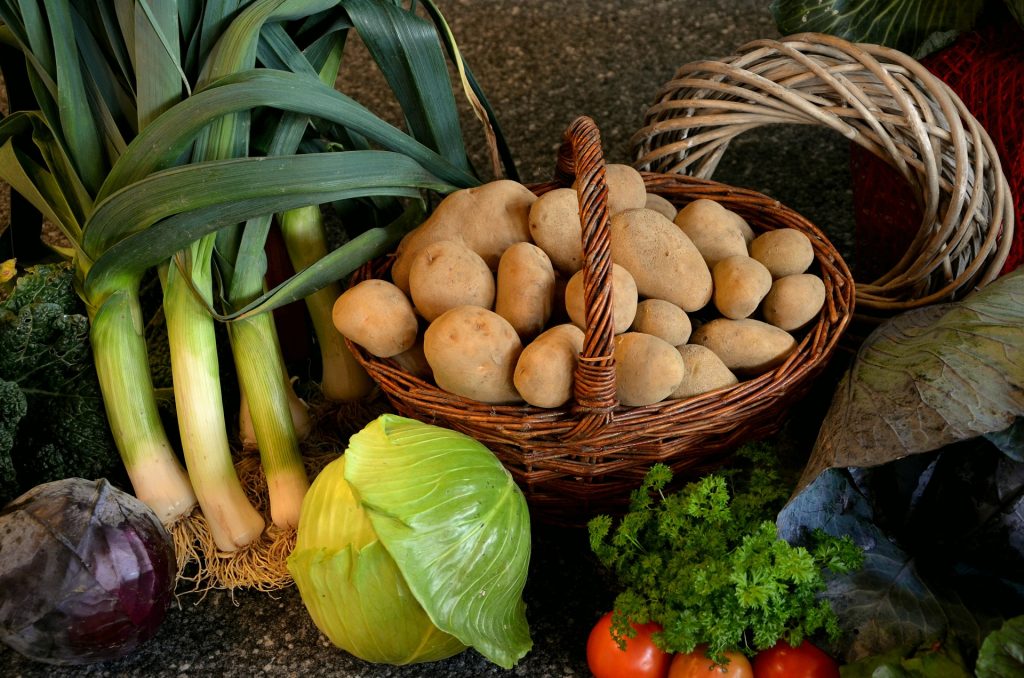
Companion planting is your best bet when it comes to encouraging your precious garden’s growth and good health organically. The simple act of placing some plants near onions can help you deter pesky garden pests and stimulate growth.
You’ll be surprised to know the myriad of benefits that come with companion planting. Sure, companion planting sounds tricky. But imagine the impressive vegetable yields when you get the art of companion planting right! But, how do you know which companion plants to choose for your onions?
In this companion planting guide, we’ll talk about a-to-z about companion planting for onions. Before jumping to the list of the best and worst companion plants for onion, let’s try to understand more about this rewarding garden technique.
Table of Contents
What is Companion Planting?
Companion planting is the technique of growing and placing different plants together. Certain plant combinations thrive well and become more productive together. It is because some of the plants show complementary characteristics. Some plants attract beneficial insects, and while some deter pests, they also encourage more growth.
One of the classic examples of companion planting is the ‘three sisters tri’- climbing beans, winter squash, and maize. These three plants were good companions due to their complementary nature. The tall corn encourages climbing beans. Additionally, the low-lying squashes protect the soil from losing moisture.
Moreover, the prickly squash leaves do a great job keeping pests away. Lastly, the fast-growing climbing beans are exceptional ‘nitrogen fixers.’ This plant supplies nitrogen to its companion plant.
The Benefits of Companion Planting

Now that you know that certain plants grow well with each other, but there are more benefits than just that. Companion planting is one of the most straightforward ways to mimic the natural ecosystem. Here all the services that you’ll be inviting to your vegetable garden with the process of companion planting:
1. Deterring Pests
Do you know that certain plants can act as insect repellents and deter critters? If you ditch the traditional monoculture garden, it’ll be more challenging for pests to attack your vegetables. In this way, they won’t be able to identify the soil patch of foods.
For example, onion itself is an insect deterrent that keeps cabbage worms, flea beetles, and many other pests away. Though garlic is not a good companion for onions, you can plant it near other plants. Garlic is fantastic at keeping the pests at bay because of its pungent and unappealing smell.
Another good companion combination is cabbage and other brassicas and wormwood. This combination is a powerful layout to steer away cabbage moths. You can also pair up beans with marigold to deter the Mexican bean beetles.
2. Shade Regulation
Not having too many open soil spaces will give you more vegetables and help the soil retain moisture. Vining plants like cucumber and squash are exceptional choices for shading the soil. If you reside in a drought-prone location, you must practice companion planting for your onions and other vegetables.
Moreover, the large plants can also protect the smaller plants from the harsh sun.
3. Attracting the Beneficials
Many vegetables and plants are helpful to attract beneficial insects. These valuable plants include miniature pest-eating wasps and pollinating bees. One such plant that attracts beneficial insects is borage.
These beneficial insects will travel and spend more time in your vegetable garden if you offer them plenty of habitats. Throughout your garden, you can include flowing crops like buckwheat, clover, and vetch. Try to choose varieties that have extended bloom durations.
4. Improving Plant Health
You can improve the health, quality, and flavor of your onions by planting certain plants. Some plants absorb specific substances from the soil. These plants or vegetables change the soil’s biochemistry, making it more favorable for the accompanying plant.
Besides, adding different plant categories will help you reduce the spread of diseases in the onion family. Though plant interactions are tricky to comprehend, results and research claim that some plants can reduce diseases’ susceptibility in other plants. One of the good examples of this case is growing basil with tomatoes.
5. Enhancing Soil Fertility
Some crops like peas, bush beans, pole beans, and legumes increase the soil’s nitrogen content. Similarly, vegetables like burdock, which have long taproots, absorb nutrients from deep soil. Such plants result in the enrichment of the topsoil.
Therefore, placing plants like burdock, beans, and peas near other shallow-rooted plants can aid growth. Not to forget, some plants also help retain soil moisture, which prevents the loss of essential nutrients.
6. Natural Supporters
Adopting the companion planting ecosystem also means inviting natural supports. Tall plants such as sunflowers and corns can support low-lying crops such as peas and cucumber. You can also plant corns and sunflowers to keep various beans such as bush beans and Mexican beans.
7. Weed Suppression
Another fantastic benefit of companion planting is weed suppression. You may be searching for different ways to prevent that pesky weed growth. The most natural way to do this is by planting sprawling vegetables like potatoes with upright, tall plants.
This garden structure will minimize open soil and growth areas. As a result, the weeds will typically have no place to grow.
8. Space Saving
One of the most significant benefits of placing another plant near the onions will save you plenty of space. It’s the perfect way to derive the most out of your small vegetable garden. You can use a vining plant or a taller plant with onions to save more space.
Moreover, it’ll restrict the space that is generally taken up by unwanted weeds. Another approach to companion planting for onions is to place quicker growing crops. In this way, you can harvest the quick-growing crops before your onions begin to grow and take up space.
The Ultimate Onion Companion Planting Guide
To grow garlic with onions or not to grow? Should I grow tomatoes with onions? What about growing cabbage with onions? When considering companion planting for onions, there’s a long list of the best and worst matches.
This guide aims to solve all the misconceptions that the internet has built up regarding onions and their companion plants. In this companion planting guide, we’ll discover the best friends and foes for your beloved onion plants.
Best Companion Planting For Onions
Luckily, you’ll have no shortage of friendly companions for onion plants. Onions themselves are natural deterrents for Japanese beetles, flea beetles, carrot fly, cabbage moths, rabbits, and aphids. Let’s skip the chit-chat and straight away get to the list.
1. Members of the Cabbage Family Companion Plants
Onions are good neighbors for the brassicas and cabbage family. There are some exceptional options of onion company plants that come from the brassicas and cabbage family. You can plant vegetables like:
- Cabbage
- Brussels sprouts
- Broccoli
- Kale
All these four options are a good company for onions. Plants from the brassicas and cabbage family have similar soil requirements to the onions. Both onions and brassicas prefer sunny garden spots and well-drained soil. Moreover, since onions are pest deterrents, they can keep away cabbage moths, cabbage maggots, and cabbage loopers.
Other onion family members like chives and leeks also pair up well with cabbage. The smell of onion drives away aphids, Japanese beetles, which are common around cabbage.
Since broccoli comes from the cabbage family, they draw the same benefits as the cabbage plants. Onions are the best plants to plant near broccoli, as they will not compete for the soil nutrients. Similarly, brussels sprouts and kale also act as good neighbors for onions.
2. Herb Companion Companion Plants
Another fantastic consideration for the onion neighborhood is herbs. When herbs are planted near any garden vegetables, they improve their companions’ flavor and quality. Thankfully, the list of herbs that go well with onions is typically longer than the herbs list that doesn’t pair up nicely.
However, you’ll be disappointed to see that chives and sage are not suitable for the growth of onions. Anyway, you can consider laying these herbs next to your onions:
- Chamomile
- Savory
- Parsley
- Dill
- Celery
Yes, you read it right! that sweet chamomile flowers appreciate living with onions. Chamomile is the best companion if you are looking to enhance the flavor of your onions. Moreover, these lovely flowers will also give a beautiful look to your onion patches.
Parsely has a close relation with carrots. Hence they can also protect the onions from a carrot fly. Like parsley, celery is also a part of the carrot family. This species can repel insects adequately. The other herbs like dill and savory are perfect options to boost the flavor profiles of vegetables.
3. Swiss Chard Companion Plants
Swiss Chard plants and onion plants, when planted together, can combat many garden problems for you. Farmers swear by Swiss chards as they provide mutual-benefits for numerous plants of the allium family.
The giant leaves of the plant do a perfect job of retaining soil moisture. Though they do not repel any bugs or pests, they set the ideal environment for onions to grow.
4. Tomato Companion Plants
In the list of friendly neighbors for this allium, tomatoes should be on the top of your list. Firstly, tomatoes and onions are an ideal pairing if you wish to enhance flavor. Secondly, onions can also assist you in confusing beetles and aphids that generally munch on tomatoes.
Therefore, say yes to tomato plants when you think of companionship for onions!
5. Carrots Companion Plants
Carrots are not challenging to grow until you have carrot flies in your vegetable garden. You must know that the carrots have a symbiotic relationship with some of the alliums. Both the plants can help each other to prevent flies.
6. Pepper Companion Plants
Like tomatoes, peppers have the same relationship with onions. Onion companionship will enhance the flavor and repel beetles, spider mites, and aphids. Spider mites are a typical guest of the pepper plants, but not if you place them next to onions.
7. Strawberry Companion Plants
Are you looking for a practical companion to repel garden pests like flea beetles and aphids? You can plant those red berries next to onions if you wish to repel away aphids from your garden. Don’t worry; your strawberries won’t end up smelling like onions.
8. Beets Companion Plants
The beet’s and onions’ roots set themselves in different levels of the soil. It means that both plants will not fight for nutrients. Besides, planing this allium plant next to beet will cut down on fungal infection.
Worst Companion Planting For Onions
If one plant thrives well with other plants, it’s no essential that it will grow well with onions. For example, you shouldn’t be planting leeks next to onions, as it can confuse onion flies, and therefore, cannot repel them.
Similarly, many other plants are a big no-no when it comes to companionship for onions. When these plants are planted near an onion patch, they might result in inadequate growth, more pests, and lacking flavor.
1. Avoid Planting: Turnips
When turnips are planted next to this allium, they can create havoc. This allium tends to hurt the flavor of turnips. Besides, you might even notice hampered root growth when planting turnips near onions.
2. Avoid Planting: Beans
Planting beans next to an onion plant will be a mistake. It would help if you weren’t farming beans next to any other vegetable that belongs to the allium family. Garlic, leeks, and onion do not create an ideal growing environment for beans and other legumes.
3. Avoid Planting: Peas
Are you thinking of planting peas next to onions? When they’re planted next to onions, they might not grow very well. The primary reason behind this is because both peas and beans grow in the same root level as the onions.
4. Avoid Planting: Sage
Most vegetable farmers will warn you against planting sage next to an onion plant. Sage can hurt the growth and productivity of onions.
5. Avoid Planting: Asparagus
When planted near onions, asparagus might have stunted growth. It might also possibly modify the taste and flavor of the vegetable. If you wish to improve the flavor of asparagus, you can plant marigolds, tomatoes, and nasturtiums oregano near them.
6. Avoid Planting: Other Alliums
If you place onions on other plants from the allium category, such as leeks and garlic, they can suffer from maggot infection. If you have been into gardening for a while, you’ll know that maggot infection moves quickly.
For this reason, you must avoid planting two alliums near each other. Please spread the garlic, leeks, and other alliums all over the garden.
Frequently Asked Questions
It’s natural to have many questions lingering when you think about vegetable pairings to grow. In this section of the post, you can go through some of the most frequently asked questions to solve your doubts.
1. What are the companion plant options for onions?
When it comes to companion planting for onions, you have to be very selective. You can include many plants from the brassicas and cabbage family, herbs, and other vegetable plants to accompany and boost the growth and flavor of your onions and avoid beetles.
The plants that you can grow near onions are:
- Tomatoes
- Lettuce onions
- Brussels sprouts
- Cabbage
- Lettuce
- Dill
- Carrots
- Strawberries
2. What should I avoid planting with onions?
If you want to create a friendly neighborhood for the onions, avoid alliums such as garlic and leeks. However, that’s not it. There are many more like:
- Garlic
- Beans Celery
- Sage
- Peas
- Pole Beans
- Bush Beans
- Corns
- Cucumbers
- Asparagus
3. What can I plant with onions to repel flea beetles and aphids?
There are numerous options if you wish to grow plants that repel aphids and flea beetles. Here are some options:
- Parsnip
- Peppers
- Strawberries
- Tomatoes
- Lettuce
- Spinach
Alternatively, you can also use a homemade organic spray to keep the aphids and beetles away. Use a repel mixture of water, garlic, and onion. When you are spraying these, make sure to use the “less is more” mantra, as too much can burn the garden vegetables.
4. Can I plant garlic next to onions?
If you opt for companionship for your onion plants, try to pair them up with something beneficial. In the case of garlic, it’ll not make much of a difference to the plant. We suggest you not put a garlic plant next to the onion plants as they are a common target for maggots.
Garlic usually is a friendly neighbor for peas, tomatoes, and cabbage.
Final Words
Companion plant is like an art for gardening enthusiasts. Isn’t the process of companion planting onions exciting and very rewarding? In the end, gardening is an art that includes relentless experimenting.
Even if you find a perfect companion for onions this year, try to shuffle up things the following year. For example, you can try accompanying them with tomatoes for this planting season. The next season, you can check out the soil conditions and plan your garden neighborhood accordingly.
Growing different kinds of plants together is a natural and organic way to boost growth. Once you have complete knowledge about this gardening technique, you can reduce the use of artificial and dangerous pesticides and chemicals.
We are sure that you’ll be surprised to see the colorful, nutritious vegetables once the best pairs are planted together. So, with this ultimate companion planting guide by your side, are you ready to welcome an amazingly delicious onion family?

James Fields is the founder of Gardener to Farmer. His passion for gardening goes back to his childhood days when he would visit his grandfather during the holidays and help him with the plants in the backyard. This has now translated to creating a dependable resource for gardening.
